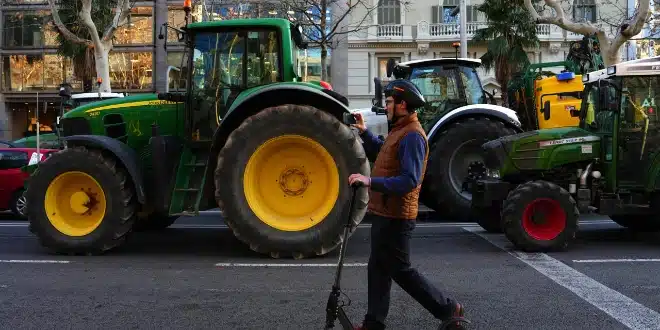For three consecutive days, Spanish farmers have orchestrated roadblocks across the nation, voicing their frustrations over stringent regulations and the influx of cheaper imports. This wave of protests saw the participation of Spain’s leading agricultural unions – Asaja, Coag, and UPA – for the first time, marking a significant escalation in the movement.
Tractor-led processions caused significant traffic disruptions, notably in Valencia, Astoria, and Castilla la Mancha. Unlike the initial two days of protests which were largely coordinated through WhatsApp by grassroots activists, the demonstrations on Thursday received formal organization from the country’s primary agricultural bodies.
Asaja highlighted on X the dire situation facing the rural community, stating, “If the tractors are protesting, it’s because the rural world feels suffocated.” In a dramatic show of discontent, nearly a thousand tractors converged on Barcelona, Spain’s second-largest city, congregating at the regional government’s headquarters.
While many protesters vacated Barcelona’s center by Thursday morning, their overnight presence underscored the severity of their grievances. The transport sector, represented by Fenadismer, reported that the protests had impacted approximately 80,000 trucks and estimated the economic toll at 120 million euros.
The demonstrations have occasionally led to confrontations with law enforcement, resulting in a dozen arrests nationwide. This unrest is part of a broader wave of agricultural protests sweeping across Europe, driven by escalating costs, surging fuel prices, bureaucratic hurdles, and the environmental mandates of the EU’s Common Agricultural Policy and its impending Green Deal.
Amid these tensions, Spanish Agriculture Minister Luis Planas acknowledged the complexity of the situation and reiterated the government’s openness to dialogue. Socialist Prime Minister Pedro Sanchez has promised to streamline CAP implementation rules and amend legislation to prevent farmers from being compelled to sell their produce at a loss, aiming to address some of the protesters’ concerns.


